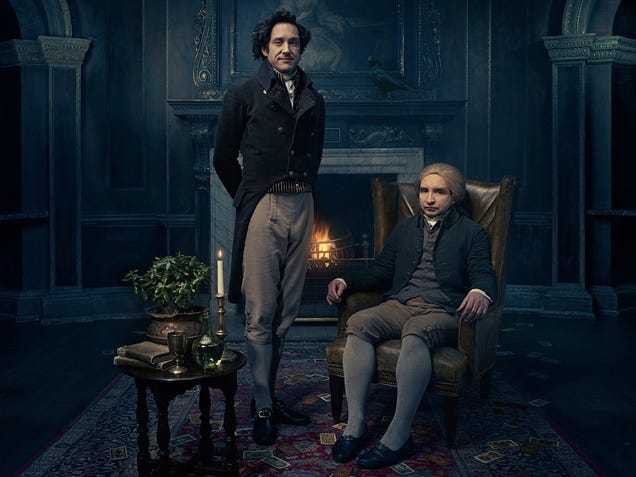Jonathan Strange and Mr. Norrell: Magic as Academics

The combination of Regency dramedy and fantasy (although ultimately a fantasy that owes more to European folklore and fairytales than Jack Vance) in Jonathan Strange and Mr. Norell is a wonderful invention, because by turning away from the traditional medieval setting of most fantasy series and throwing its content into sharper relief, Susanna Clarke and her adaptors Peter Harness and Toby Haynes allow us to focus on the meaning of magic.
And magic in this world is essentially intellectual capital, and academia’s uses and misuses of it.
The first episode begins with the young John Segundus (Edward Hogg) giving an talk to the Yorkshire Society of Magicians, asking the question “why is magic no longer done in England,” only to be curtly rebuffed by the old guard, who argue that “magicians study magic…you don’t expect an astronomer to create stars, or a botanist to create new flowers.” This conflict is familiar to anyone who’s ever been to an academic conference where some up-and-coming scholar takes a swing at established orthodoxy, and to anyone who’s ever read Thomas Kuhn’s The Structure of Scientific Revolutions. However, the Regency period adds a sharper class critique: as Dr. Foxcastle (Martyn Ellis) explains, “practical magic is not a thing for the gentlemen of this society, nor any gentleman,” because it associated with working-class street performers like Vinculus (Paul Kaye). Only by making magic strictly theoretical rather than applied can it be made safe for aristocratic society.
Likewise, the conflict between the Yorkshire Society and the titular Mr. Norell (Eddie Marsan), which ends in spectacular fashion with the talking statues of Yorkminster Cathedral, is ultimately an academic dispute where one paradigm is replaced (abruptly) with another. Like Dr. Foxcastle, Mr. Norell argues that John Segundus is posing a “wrong question,” and ultimately that theoretical magic is incomplete. However, Mr. Norell is ultimately not that different from the men of the Yorkshire Society. Like them, he has spent his life studying books – but because of his 19th century form of intellectual property monopoly by buying up all the books of magic in England, he’s been able to create spells by examining this assembled literature “when they’re considered altogether.” Likewise, in his conflict with Vinculus (self-appointed “magician of Threadneedle Street,” his hatred of the yellow curtain “charlatans” who have damaged the reputation and prestige of his academic discipline, Mr. Norell shares the ultimately exclusionary tendencies of the Yorkshire Society – hence settling his dispute with the Society by having them sign a contract forcing them to retire when he pulls off the Miracle of York.

In his character, Mr. Norell is ultimately a caricature not of a wizard (he doesn’t even have a beard or a pointy hat!) but of an academic. He’s dull, pedantic, obsessed with academic literature, and he’s socially awkward to a fault – which makes him a secretly perfect vehicle for much of the audience. How many fantasy aficionados, when faced with the prospect of a high society party, have wished “to go home and read a book”? Yet despite his introverted nature, Mr. Norell shares the academic’s desire for recognition – as much as anything else, it is Sir Walter Pole’s dismissal that “magic is not respectable” that sets him against Vinculus (and thus setting in motion the second half of Vinculus’ prophecy) and drives him to summon the Gentleman with the Thistledown Hair (Marc Warren) to resurrect Lady Pole.
Mr. Norell refuses to do the party tricks that Drawlight (Vincent Franklin) and Lascelles (John Heffernan) promise will bring him popular appeal, but the thought of performing a great feat of magic (even one that invokes the “always regretted” help of a “poisonous race”), one that would prove him to be the “greatest magician of the age…the man destined to restore magic to England” is enough to make him take the plunge. Likewise, once he has summoned the Gentleman, he refuses his offer of resurrecting Lady Pole if it means that he must “tell the world that your greatest achievements are due in large part to me” – and thus half of Lady Pole’s life, and her finger is traded away.

By contrast, Jonathan Strange (Bertie Carvel) is a different kind of academic caricature – the natural genius. Like Matt Damon in Good Will Hunting or the real-life case of Srinivasa Ramanujan, Jonathan Strange has a gift for his chosen subject that transcends academic preparation. Without Mr. Norell’s books or training, with only two scraps of paper, Jonathan Strange easily accomplishes that which Segundus and the whole of the Yorkshire cannot. Also in contrast to Mr. Norell, Strange initially lacks drive – a rather shiftless upper-class former ironmonger, former fossilhunter, and reluctant landowner, he takes up magic to find something to “occupy his time,” and because prophecy (and Mr. Norrell’s unwitting contribution of two spells, subverting his own monopoly) is leading him onward.
Ultimately, the first episode of Jonathan Strange and Mr. Norell leaves us in suspense as to what happens when these two very different approaches to magic, these two different approaches to academics, finally meet. So you’d better tune in next Sunday.


